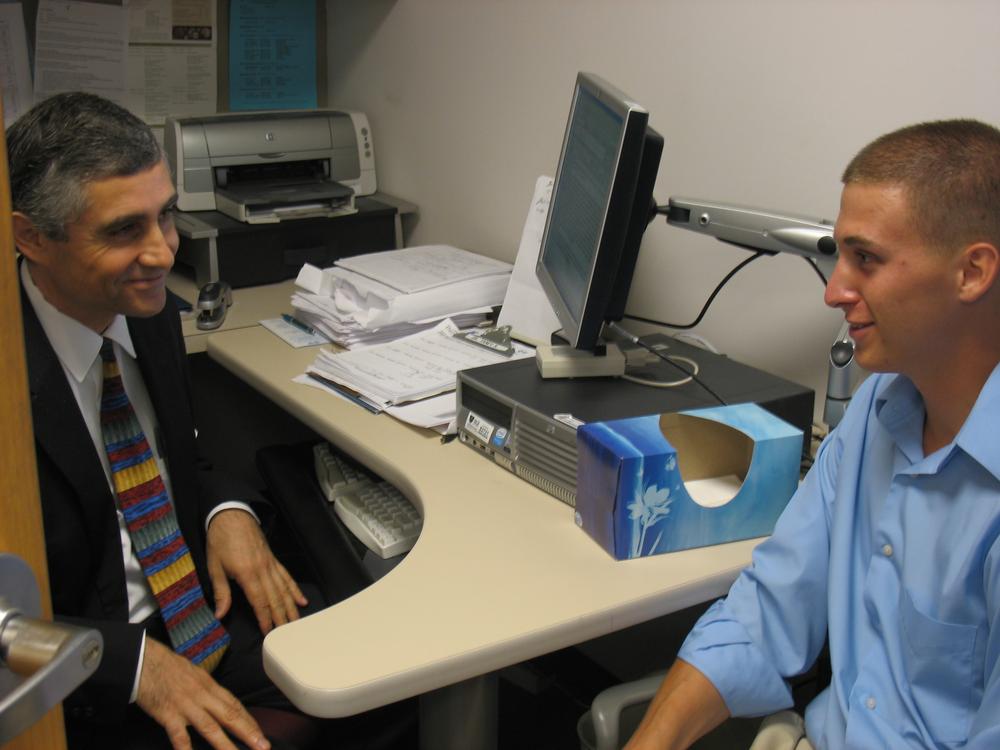Advertisement
A Home Base For Veterans With PTSD
ResumeJon Zagami looks like a healthy 26-year-old. He has a long distance runner’s body and a buzz cut. He recalls the moment his life changed when he was doing crowd control at a checkpoint in Iraq.
"I don’t remember most of that day or the following days after," Zagami said. "I was in kind of in a trance or a daze. Finally, when I kind of woke up a few days later, I was nauseous and throwing up all the time and saying, 'What is this from?' "

It was 2003 and, "ever since then, I’ve had blinding headaches and my balance is off and it’s just one issue after another that led up to that stroke," Zagami said.
The stroke happened after Zagami returned and was a freshman in college. Soon after, he was diagnosed with a traumatic brain injury and post-traumatic stress disorder, or PTSD. He has trouble sleeping, a terrible short-term memory and headaches that make him pass out. For six years he’s been getting treatment through the Veterans Affairs health care system.
"After just getting frustrated from the VA system and so many different doctors and so many doctors cycle through," Zagami said. "Every time I show up for an appointment it would be a new neurologist or new cardiologist.
"You just get beat down and say, 'I’m just going to have to live with these health issues the rest of my life.' And it’s just not a fun way to live."
But he got a little hopeful when his sister told him about a new program she heard about while watching a Red Sox game on TV.
It was a public service announcement with Red Sox pitcher Tim Wakefield pitching the new "Home Base" program.
The program is funded by the Red Sox Foundation, which has teamed up with Massachusetts General Hospital to provide free care for veterans with PTSD and traumatic brain injuries. Red Sox Chairman Tom Werner says the idea came to him in 2007 when the team won the World Series and visited Walter Reed Army Medical Center.
Werner saw how the veterans responded to players.
"David Ortiz is a hero to them, but he thinks they are heroes," Werner said. "Because you just see these average guys who come from all over the country who just wanted to give something back to their country and are now in great pain. There was just a general sense of, 'What could we do to help?' "
Home Base started in 2009 and recently opened its own clinic near MGH. The program has treated more than 200 veterans and their families. That's a small portion of the 12,000 Massachusetts veterans with mental disorders who get help from the VA.
Still, Ross Zafonte, director of traumatic brain injury for Home Base, says the program compliments what the VA offers.
"I think what the Red Sox Home Base program offers is an alternative route for many reluctant veterans or our nation's heroes to begin to seek care," Zafonte said.
Army Sgt. George Carvalho lost the fingers of his right hand in Iraq and only reluctantly admits he has deeper invisible wounds that he's embarrassed to acknowledge.
"You’re a solider, you are supposed to be strong," Carvalho said. "You’re not supposed to have any problems and to admit it is the biggest and first step."
He took the first step because Home Base is affiliated with the Red Sox.
"(I've) been a fan since I was very, very little and to me it’s one of the greatest things to see a sport organization step up and do this for the veterans," Carvalho said.
Jon Zagami is also a huge Sox fan. He watched the first World Series win via satellite in Iraq. He never thought he'd have this close a connection to the team. The Home Base program has really helped him, he says. He sleeps better and has fewer night terrors.
"As long as I’m feeling better and I'm making progress," Zagami said, "I feel like there’s hope. I never got that feeling at the VA. I felt like I was another victim and you kind of had to deal with it."
The Home Base program will treat any veteran for free, but is focusing its efforts on those who have served since Sept. 11.
